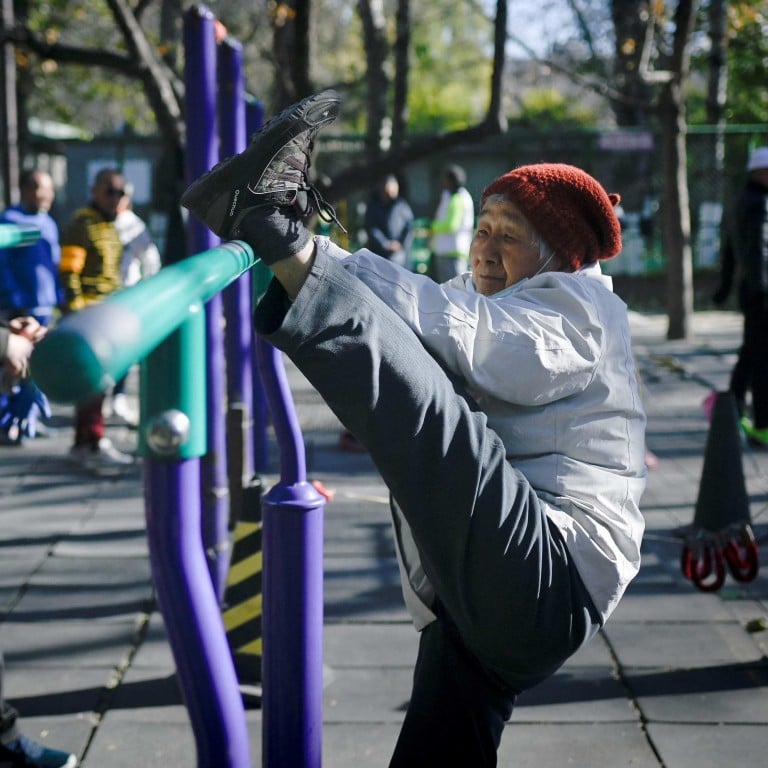
Why have millions dropped out of China’s state health insurance scheme?
- Enrolment in China’s state health insurance system fell by about 17 million subscribers last year due to a number of factors
- The system is under pressure from a growing elderly population and shrinking workforce
For the first time, a “political task” was assigned to teachers at Mata School in a mountainous village in western China this year – to make sure all students are covered by the country’s basic health insurance scheme.
The school, dedicated to impoverished and troubled children in Shaanxi province’s Zizhou county, was ordered by the local government to push parents to ensure their children are insured.
Families, according to deputy principal Ma Jun, had become hesitant over whether to continue taking part in the scheme amid rising premiums and their stagnating incomes.
But despite the best efforts of the teachers, “there are still a couple of students in each class whose families have refused to pay for next year’s insurance”, said Ma.
While it covered over 96 per cent of China’s 1.4 billion population between 2019 and 2021, last year it fell by over 1 percentage point, meaning a loss of about 17 million subscribers, according to the National Healthcare Security Administration (NHSA).
The drop can be attributed to multiple reasons, including growing reluctance to enrol in the scheme due to financial difficulties amid an economic downturn and factors induced by urbanisation and a more integrated insurance system overall, according to social security and rural affairs experts.
China’s state health insurance system is made up of two schemes, with the urban employees’ scheme dating back to 1998, and the urban and rural residents’ scheme, which has been in place since 2003.
‘Enthusiasm is not high’: China’s private pensions struggle to lure investors
The urban employees’ programme is mandatory for workers who are formally employed, and has better financial coverage and benefits, with contributions to the premiums made by both employers and employees.
The urban and rural residents’ scheme, meanwhile, is intended for anyone who is unemployed, including children. It is voluntary and has a lower fixed annual premium compared to the urban employees’ programme. In recent years, a government subsidy accounted for over 60 per cent of the total premium.
As a large number of migrant workers move from rural areas to cities for work amid urbanisation, subscribers to the urban employees’ programme rose by over 8 million last year, the NHSA said. In contrast, roughly 25 million dropped out of the urban and rural residents’ scheme.
Professor He Wenjiong, deputy director of the China Association of Social Security, said besides the influence from urbanisation, the drop could be partly attributed to technical improvements, which have prompted some to reduce the number of schemes they are enrolled in.
There’s still a big group of low-income people, to whom paying the premium is a big burden
Since the state health insurance system is managed by local governments, for decades, policyholders had only been allowed to claim expenses in one province, leading some migrant workers to take out plans in their hometown and their place of work.
The problem, though, was solved last year with cross-province reimbursement allowed.
“There are, of course, other reasons, including the affordability of premium prices for cash-strapped residents and inadequate health insurance awareness,” said He.
The minimum personal contribution required for the voluntary urban and rural residents’ programme has surged from just 10 yuan a year when it was established in 2003 to 380 yuan this year.
“Counting my two children and two parents, my family of six need to pay 2,280 yuan. It’s not a small sum for a rural family, especially when the economic condition is bad,” said Li Nian, a resident of a village under Handan city in the northern Hebei province, who has opted to not enrol himself or his wife in the scheme to save money.
Last year, the average annual disposable income for rural residents across China was slightly above 20,000 yuan (US$2,819), according to official data.
Region adds IVF to health insurance as China ramps up birth-boosting policy push
“The premium has kept increasing, but not my income,” Li added.
Zhu Qizhen, a retired professor who specialised in rural issues, said the increasing co-payments have also made some rural residents doubt the value of the coverage.
“Some discontinue the insurance because they’re dissatisfied with the proportion of reimbursement, because there’re still many medications and services that are not covered by the scheme,” he said.
There are also others who tend to push their luck, especially younger ones who believe they’re healthy enough
Some may also consider the money to be wasted if they do not need to make any claims, Zhu said.
Unlike car insurance, which allows the insured to pay less in the following year if no claims are made, premiums paid under the urban and rural residents’ health insurance scheme are cleared on a yearly basis, he added.
“There are also others who tend to push their luck, especially younger ones, who believe they’re healthy enough,” he added.
Professor Li Ling, who specialises in medical insurance at Peking University’s National School of Development, has called for reforms of the basic health insurance for urban and rural residents, with a proposal for the lower fixed premium to be linked to earnings.
Under the current system, while policyholders are becoming less interested due to the rising premiums, local governments are also under an increasingly heavier burden as subsidies rise, she noted in an interview with the Economic Observer in August.
Beijing has pledged to increase the subsidy by 30 yuan (US$4.2) for each policyholder this year, representing a 30 billion yuan increase.
To ease the pressure for both sides, Li suggested, “we should decide on personal contributions based on individual income, and give them the same treatment when they go to the hospital”.
This is an example of equality, she argued, with the existing method, in her view, “equalitarianism”.

